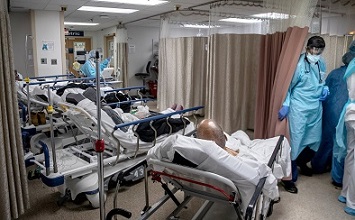U.S. Medical News: America Faces Rising COVID-19 Hospitalizations Amidst Summer Uncertainty!
Weekly COVID-19 hospitalizations increase for the second consecutive week as the nation grapples with potential summer surge.
U.S. Medical News: In a concerning development, COVID-19 hospitalizations in the United States have risen by over 12% in the past week, according to recent data published by the Centers for Disease Control and Prevention (CDC).
https://covid.cdc.gov/covid-data-tracker/#trends_weeklyhospitaladmissions_select_00
 Pic Credit: Victor J. Blue/NY Times
Pic Credit: Victor J. Blue/NY Times
This marks the second consecutive week of a surge in hospital admissions, with at least 8,035 patients diagnosed with COVID-19 being admitted nationwide during the week of July 22. This figure represents a notable increase from the 7,165 admissions reported the week before.
Another crucial indicator of the virus's resurgence is the rising number of COVID-19 cases presenting at emergency rooms across the country. As of July 28, an average of 0.92% of the past week's emergency room visits were attributed to COVID-19, up from 0.51% at the end of June.
https://covid.cdc.gov/covid-data-tracker/#ed-visits_all_ages_combined
The recent surge comes after a prolonged period of declining COVID-19 trends throughout the nation, following the peak of infections during the winter months.
The latest data reflects the most significant percentage increases in hospitalizations since December, raising concerns among health experts and authorities.
The situation has prompted questions about whether the U.S. is experiencing a summer surge similar to those witnessed in previous years. Despite the rising hospitalizations, experts point out that the current numbers are still significantly lower than those recorded during the summer waves in 2021 and 2022. For instance, in 2021, the U.S. experienced a sharp increase in hospitalizations driven by the Delta variant, with a surge of 20,029 additional admissions from June to July.
Kathleen Conley, a spokesperson for the U.S.CDC, remarked that increases in COVID-19 cases during the past three summers have been observed before, making the current uptick less surprising.
Unlike previous waves that were often linked to the spread of a single dominant variant, this summer's increase is attributed to a mix of descendants from the XBB variant, which first drove infections during the winter. Notably, no single variant has emerged as the predominant cause of infections this time. The largest subvariants within the XBB lineage, including XBB.1.16, XBB.1.9.1, XBB.2.3, XBB.1.6, or EG.5 strains, each account for between 10% and 15% of infections nationwide. Some local
U.S. Medical News outlets have claimed that the new EG.5 sub-lineages which are claimed to be more transmissible are driving the new surge but his has not been validated yet
as genomic sequencing in the country as been very low.
https://github.com/neherlab/SARS-CoV-2_variant-reports/blob/main/reports/variant_report_latest_draft.md#eg5-xbb192-with-sf456l
American health authorities are closely monitoring the situation and preparing for a new round of COVID-19 vaccinations scheduled for this fall. Updated vaccines targeting the XBB variants are expected to be available by late September, and the U.S. FDA has already requested drugmakers to produce these new formulations. (To date no one really knows if these vaccines or boosters truly works and are safe!)
Despite the rising numbers, experts urge caution in interpreting the data. The current hospitalization figures remain among the lowest recorded since August 2020, indicating that the overall burden of COVID-19 in the population is still relatively low compared to previous waves. Furthermore, data surveillance challenges, reduced testing, and the transitioning of focus away from COVID-19 may impact the accuracy of reported numbers.
While wastewater analysis has shown a 65% increase in national traces of the virus in the past month, experts caution that it may not always correlate directly with the true population burden of COVID-19.
https://biobot.io/data/
Nevertheless, wastewater surveillance remains a useful early signal to monitor community transmission.
COVID-19 deaths have not risen proportionately with the increase in hospitalizations, with the most recent data reporting 494 deaths for the week of July 1, the lowest number since the start of the pandemic. However, experts caution that deaths can be a lagging indicator, and the situation may change if infections continue to rise.
As the U.S. faces uncertainty surrounding a potential summer surge, health authorities and the public remain vigilant in tracking the spread of COVID-19. The upcoming availability of updated vaccines targeting the XBB variants may help bolster protection against currently circulating strains. Despite the rising hospitalizations, health experts advise remaining calm and cautious while closely monitoring the situation to prevent any further escalation of the pandemic.
For the latest
U.S. Medical News, keep on logging to Thailand Medical News.
